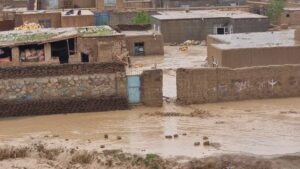KABUL (SW) – Evidently traumatized, young Qamar Uddin was leaning against a wall and had his two white sticks covered with handkerchiefs standing next to him.
Kids who played around him would make him restless whenever they got closer to him, and he would scare them away with the sticks. For a moment we saw this 17-year-old young man and then came closer to him. Initially, he did not want to talk to us.
Later, with keen interest he said he belongs to Faryab’s Pashtun Kot district and some time ago he chose an irregular refugee route abroad, but the detention and harassment by Iranian border troops has had a bad effect on him.
Qamar Uddin slowly and gradually began narrating the tale of his irregular migration. He said he along with some of his friends had migrated to Iran illegally, and after leaving Pakistan, he faced by severe hunger and thirst in Iran, and was also harassed and smuggled by smugglers. He was later taken into custody by the Iranian police and put in an unbearable place.
Qamar Uddin said poverty and frustration forced him again to go to Iran through the same irregular route.
He thought he might reach his goal this time, but after a while of work, a high-rise building collapsed and he lost a leg in nit forcing him to spend all his savings on his treatment. But, then he was not healed. The young man siad he now feels disabled, his heart is tired and he cannot go out with his friends.
Qamar Uddin’s cousin, Mohammad Asif, said he is suffering from a mental illness. According to him, Qamar Uddin behaves erratically with everyone since, including with his mother that continues to take care of him.
Mohammad Naseem Salam, head of the Department of Refugees and Repatriation in Faryab, told SW the rise in unemployment rate is fueling the instances of irregular migration.
According to him, every day 30 to 40 repatriated persons apply for assistance.
According to the International Immigration Organization (IOM), one in three people in Afghanistan have left their country and now more than 3 million Afghan refugees live in other countries around the world.
The figures show that the majority of Afghan refugees live in Iran, Pakistan and Saudi Arabia, respectively.
ENDS







